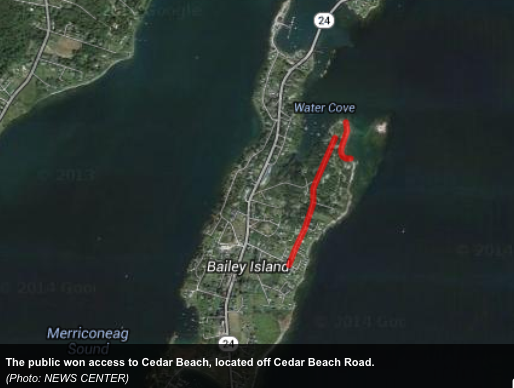The Maine Supreme Judicial Court heard arguments Wednesday in the appeal of a case that granted the public use of Cedar Beach Road in Harpswell.
More than 50 people – some from as far away as Cape Cod – showed up to support public access to the beach. A Maine Superior Court decision on Sept. 15, 2014, allowed public use of a road on Bailey Island that had been blocked since 2011, when landowners Charles and Sally Abrahamson stopped allowing access. The road had historically been used by residents to access Cedar Beach, and recreational use of the beach has swelled since the decision.
The 73-page decision by Justice Nancy Mills granted the public a prescriptive easement over Cedar Beach Road because there had been uninterrupted public access for multiple decades. Since the initial lawsuit was brought against the Abrahamsons, the land has been sold to Betsy Atkins, the owner of a real estate company, who also has denied public access to the road and continued the lawsuit through her company, Gables Real Estate LLC.
“We’re here today because a couple too nice for their own good was upset with ungrateful use of their land, so they put up a fence,” said Christian T. Chandler, representing Gables Real Estate in the case, who argued that Mills incorrectly applied the facts of the case in her decision to grant public access.
“We believe the court below clearly misapplied the law to the evidence,” said Chandler. “The court consistently relied on the belief expressed by the public, rather than what she should have been doing, the actions of the owner.”
Attorney David Bertoni, representing the Cedar Beach/Cedar Island Supporters group, said this case in particular meets all of the narrow requirements for the public to be granted a prescriptive easement.
To prove that, said Bertoni, there must be a demonstration of consistent use and a lack of effort by the landowners to object to public use.
Bertoni’s argument was that the few demonstrated moments of non-acquiescence to public access – a letter to the sheriff that may or may not have been sent; a fence put up in 1979 by someone other than the landowners that was torn down within a day; postings in 1987; and an affidavit in 1999 – were insufficient to demonstrate that the landowners took the necessary measures to prevent a prescriptive easement.
“Here’s the channel that you need to navigate: You need to have an owner that doesn’t want you to use the property, but is sufficiently silent,” said Bertoni. “If not this case, then what case would the public be able to get a prescriptive easement?”
The justices expressed the difficulty of the need to balance public beach access with landowners’ rights to their land.
“This case focuses on access to what the court has said regularly is really a critical resource in a state like Maine. And that is the public’s ability to reach the water, which has been recognized as an important public right since statehood,” said Chief Justice Leigh Saufley. “In a case like this, there ought to be clearer law for the landowner and the public.”
The justices questioned the defense’s assertion that laches – a legal defense claiming that the plantiff’s delay in seeking recourse through the court prevents a proper defense because of a lack of surviving witnesses – was sufficient to invalidate the decision.
“You need nothing more than the lack of witnesses?” said Justice Ellen Gorman. “Wouldn’t laches arise in every case if the history is more than 30 years old?”
The court questioned both sides thoroughly for about an hour. Bertoni said he is confident that Mills’ decision will be upheld.
“The voyage to get the golden fleece traveled through treacherous waters, but we’ve made it to the shore,” said Bertoni.
He said the case is important to the future of public access to the water in Maine.
“It’s a real test of whether this doctrine of prescriptive easement still lives on,” he said. “I believe we’ve threaded that needle.”
The defense said the lower court’s improper application of evidence will win them the appeal.
“I think the facts are fairly clear here,” said Chandler. “Whether the court agrees with me, we’ll see.”
Supporters of access to the beach say they’re confident they will be able to continue using the road.
Helen Kitchel, 65, of Harpswell, said she’s been using Cedar Beach Road for years and came out to offer support to the plaintiffs.
“It was a place we all grew up going to,” said Kitchel. “Most of us are here for our grandchildren, so they can continue using it like we did.”
cchase@coastaljournal.com
Send questions/comments to the editors.



Success. Please wait for the page to reload. If the page does not reload within 5 seconds, please refresh the page.
Enter your email and password to access comments.
Hi, to comment on stories you must . This profile is in addition to your subscription and website login.
Already have a commenting profile? .
Invalid username/password.
Please check your email to confirm and complete your registration.
Only subscribers are eligible to post comments. Please subscribe or login first for digital access. Here’s why.
Use the form below to reset your password. When you've submitted your account email, we will send an email with a reset code.